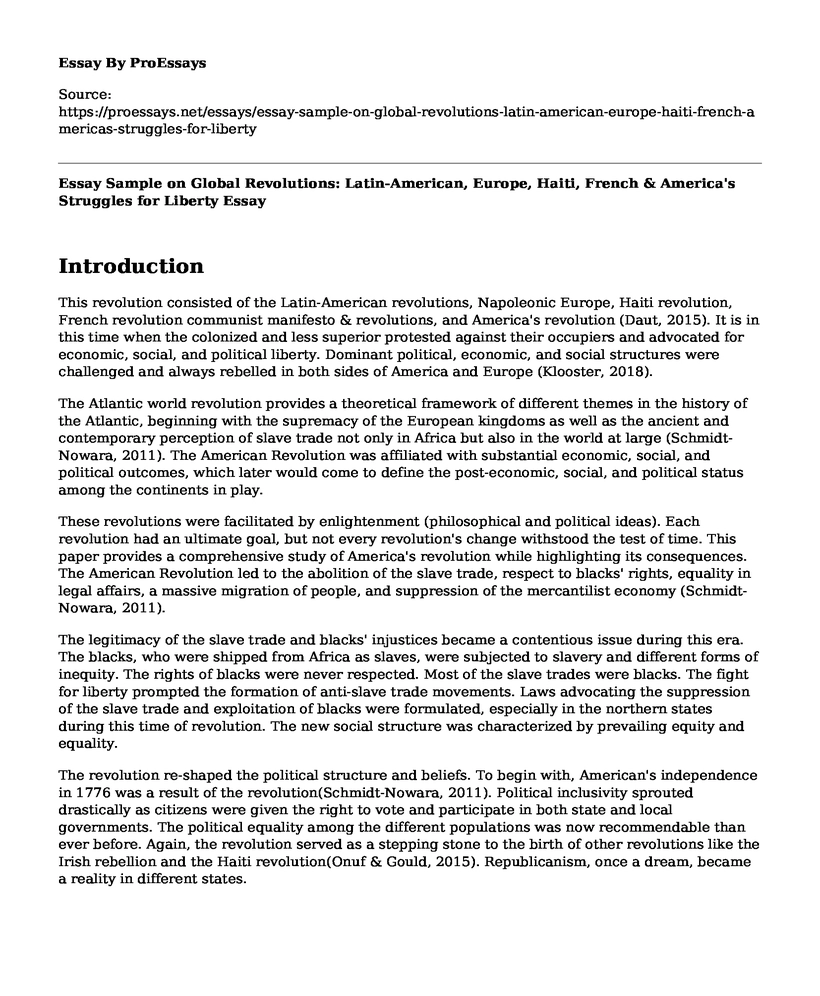Introduction
This revolution consisted of the Latin-American revolutions, Napoleonic Europe, Haiti revolution, French revolution communist manifesto & revolutions, and America's revolution (Daut, 2015). It is in this time when the colonized and less superior protested against their occupiers and advocated for economic, social, and political liberty. Dominant political, economic, and social structures were challenged and always rebelled in both sides of America and Europe (Klooster, 2018).
The Atlantic world revolution provides a theoretical framework of different themes in the history of the Atlantic, beginning with the supremacy of the European kingdoms as well as the ancient and contemporary perception of slave trade not only in Africa but also in the world at large (Schmidt-Nowara, 2011). The American Revolution was affiliated with substantial economic, social, and political outcomes, which later would come to define the post-economic, social, and political status among the continents in play.
These revolutions were facilitated by enlightenment (philosophical and political ideas). Each revolution had an ultimate goal, but not every revolution's change withstood the test of time. This paper provides a comprehensive study of America's revolution while highlighting its consequences. The American Revolution led to the abolition of the slave trade, respect to blacks' rights, equality in legal affairs, a massive migration of people, and suppression of the mercantilist economy (Schmidt-Nowara, 2011).
The legitimacy of the slave trade and blacks' injustices became a contentious issue during this era. The blacks, who were shipped from Africa as slaves, were subjected to slavery and different forms of inequity. The rights of blacks were never respected. Most of the slave trades were blacks. The fight for liberty prompted the formation of anti-slave trade movements. Laws advocating the suppression of the slave trade and exploitation of blacks were formulated, especially in the northern states during this time of revolution. The new social structure was characterized by prevailing equity and equality.
The revolution re-shaped the political structure and beliefs. To begin with, American's independence in 1776 was a result of the revolution(Schmidt-Nowara, 2011). Political inclusivity sprouted drastically as citizens were given the right to vote and participate in both state and local governments. The political equality among the different populations was now recommendable than ever before. Again, the revolution served as a stepping stone to the birth of other revolutions like the Irish rebellion and the Haiti revolution(Onuf & Gould, 2015). Republicanism, once a dream, became a reality in different states.
Conclusion
In conclusion, the American Revolution is one of the many revolutions which took place in the late eighteen and nineteen century (Daut, 2015). The prime facilitator of the American Revolution was enlightenment. The efforts by the natives to defy and oppress the colonizers had significant social, political, and economic impacts. In summary, trade agreements and treaties were formed concerning the suspension of restricted economic policies. Slave trade and violation of blacks right was abolished, the political structure changed, making states more democratic, and finally, the establishment of a stable society. However, despite the joy, the revolution witnessed some agonies in the process. The pursuit of social, political, and economic liberty amounted to a devastating war, leading to unimaginable loss of human lives and disputes among nations.
References
Onuf, P. S., & Gould, E. H. (Eds.). (2015). Empire and Nation: The American Revolution in the Atlantic World. JHU Press.
Klooster, W. (2018). Revolutions in the Atlantic World, New Edition: A Comparative History. NYU Press.
Schmidt-Nowara, C. (2011). Slavery, freedom, and abolition in Latin America and the Atlantic world. University of New Mexico Press.
Daut, M. (2015). Tropics of Haiti: Race and the Literary History of the Haitian Revolution in the Atlantic World, 1789-1865 (Vol. 8). Oxford University Press.
Cite this page
Essay Sample on Global Revolutions: Latin-American, Europe, Haiti, French & America's Struggles for Liberty. (2023, Mar 27). Retrieved from https://proessays.net/essays/essay-sample-on-global-revolutions-latin-american-europe-haiti-french-americas-struggles-for-liberty
If you are the original author of this essay and no longer wish to have it published on the ProEssays website, please click below to request its removal:
- Research Paper on Roman Empire and Egyptian Empire
- Criminal Investigation on the War Crime Paper Example
- Article Analysis Essay on 'King Philip's Herds: Indians, Colonists, and the Problem of Livestock in Early New England'
- The Abolition of Slavery: Its Impact on America's Rise - Interview Example
- Essay Sample on Climate Change: Pre-Industrial Activity & Global Temperature Fluctuations
- Popular Sovereignty: The Texas Revolution and Its Voters - Free Essay
- Report on Revolutionary Alliance: Past and Present Goals for China's Liberation and Reconstruction







